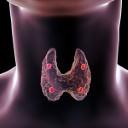-
Survival Statistics 101
Survival statistics are important—and sometimes confusing. Cancer Today spoke with statistics experts about what these numbers really mean.
by Ashley P. Taylor
-
“Congrats! You Have the ‘Good’ Cancer”
Many people know thyroid cancer as a cancer type with a relatively good prognosis, but the disease still has profound effects on patients and survivors, writes thyroid cancer survivor Carly Flumer.
by Carly Flumer
-
Learning the Language of Chemotherapy
Cancer patients often do not understand words their doctors use while talking about chemotherapy, but a new video series helps explain these terms.
by Jen Tota McGivney
-
Misunderstandings About Cancer DNA Tests
Many cancer patients who received genomic testing of their cancers in a clinical trial did not fully understand the purpose of the testing.
by Emma Yasinski
-
What Not to Say to a Cancer Patient
When visiting a friend or family member who is sick, it's good to leave platitudes at the door.
by Michael Gavaghen
-
Considering the Term “Cancer Survivor”
A study investigates how people who have been diagnosed with cancer feel about being called survivors.
by Jen Tota McGivney
-
What Do Clinical Trial Endpoints Really Measure?
A study investigates whether a commonly used clinical trial endpoint, progression-free survival, can be used to predict quality of life.
by Jon Kelvey
Cancer Talk
Lessons From 20 Years Living With Cancer
Multiple myeloma survivor Jonathan Gluck reflects on uncertainty, and the scientific progress that has kept him living with cancer for more than two decades.
by Eric Fitzsimmons
The Enduring Importance of Cancer Disparities ResearchOpening session from AACR conference highlights how perseverance and adversity have informed cancer disparities research over the years.
by Eric Fitzsimmons
Most Cancer Survivors Don’t Meet Healthy Diet GoalsDespite research linking fruits and vegetables to cancer survival, many people do not change their eating habits after diagnosis.
by Darlene Dobkowski
Many People Don’t Get Colonoscopy After Receiving Abnormal Blood TestsAbout half of people who receive abnormal results from colorectal cancer screening tests don’t follow up with a colonoscopy.
by Laura Gesualdi Gilmore











